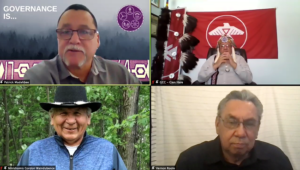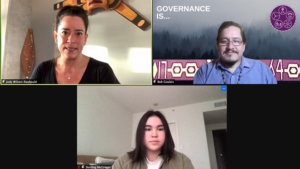Anishinaabe Governance is the journey and evolution of Anishinabek

By Marci Becking
ANISHINABEK NATION TERRITORY – “We have to go to the language,” said Anishinabek Nation Head Getzit Nmishomis Gordon Waindubence to start the “Anishinaabe Miikan: Our Journey” virtual conference. “The language will not come to us. We need to teach our kids identity and be proud of it – if we want to step forward in this Anishinabek Nation.”
The first day of the virtual conference focused on the overarching goals of Anishinabek self-determination and self-government across time and the spirit and intent of current governance initiatives: the restoration of Anishinaabe Governance and Law.
Language and culture are a part of the proposed Anishinabek Nation Governance Agreement with Canada said the Commissioner on Governance, Patrick Madahbee, to the 110 participants gathered virtually for Day One of the Governance Summit Series II on Feb. 16 via Zoom for E’Dbendaagzijig Niigaan Zhaamin – Forward Together.
“This process is our journey and the evolution of Anishinabek,” said Commissioner Madahbee. “This is the guiding principle of Ngo Dwe Waangizid Anishinaabe – One Anishinaabe Family. The Governance Agreement is tool we can use to take us further toward our long-standing vision and goals.”
In 1995 when leadership gave the mandate to start this process, the spirit and intent were clear to move cautiously and incrementally.
“Start with only four pillars: Elections, Language and Culture, citizenship, and fiscal operations and management. These were the foundational elements to build onto,” said Commissioner Madahbee. “Our leadership did not abandon the protection of inherent rights, sovereignty, treaty and Aboriginal rights; we did not release the federal government from their fiduciary obligation or tax immunity. With Own Source Revenue, we’ve held that off and put it to the side— we will not agree to that. And most important is the highest order of government being at the First Nation level.”

To end Day One, MP Jody Wilson-Raybould, Independent for Vancouver Granville, spoke about nationhood and advancing Anishinabek priorities. She said that if the Anishinabek Nation ratifies this Governance Agreement, it will be the biggest self-governing nation in the country.
“You will have the benefit of sitting at a collaborative fiscal table with the other 25 self-governing nations – which is pretty powerful and you will play a key role in that,” said Wilson-Raybould. “We have fear around the devil that we know rather than the devil that we do not. Changing from the status quo cannot be worse than under the Indian Act, having a government in Ottawa dictate how we govern ourselves. We can go slowly or we can go quickly. The Anishinabek Nation has extraordinary examples of sectoral governance agreements— you have economic powerhouses.”
“You have the opportunity to develop how you want to elect your leaders, how you are going to make decisions. Who your citizens are is fundamental to driving the nation and rebuilding. I would look to other communities who have gone through this process and have been successful. If you ratify your Governance Agreement, you will be a powerhouse – unprecedented in this country. There is nothing more powerful than having an Agreement that citizens can see themselves in and take ownership of.”
“One of the myths out there is that the Chiefs will have more power,” said Grand Council Chief Glen Hare. “That is absolutely not true. When this Agreement is ratified, the authority is the people in our communities [that ratify], not the other way around.”
Grand Council Chief Hare is hopeful that all 39 First Nations will engage and implement Anishinaabe Governance and, eventually, will ratify the proposed Anishinabek Nation Governance Agreement with Canada. Anishinabek Nation citizens in Magnetawan First Nation and Nipissing First Nation are voting this month on the proposed Governance Agreement.
The Government of Canada will formally recognize the First Nations that ratify the proposed Governance Agreement as governments and their law-making powers and authority over how their First Nations are governed. Anishinabek First Nations that ratify the proposed Governance Agreement will be removed from provisions of the Indian Act that deal with governance such as leadership selection and citizenship, and enact laws in language and culture, and operations and management of government.


